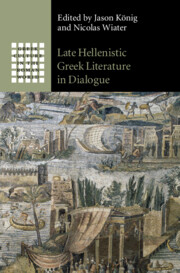Book contents
- Late Hellenistic Greek Literature in Dialogue
- Greek Culture in the Roman World
- Late Hellenistic Greek Literature in Dialogue
- Copyright page
- Contents
- Figure
- Contributors
- Preface
- Abbreviations
- Introduction
- Chapter 1 The Empire Becomes a Body
- Chapter 2 Pyrenaean Mountains and Deep-Valleyed Alps
- Chapter 3 Sailing the Sea, Sailing an Image
- Chapter 4 Ecocritical Readings in Late Hellenistic Literature
- Chapter 5 Civic and Counter-Civic Cosmopolitanism
- Chapter 6 The Wrath of the Sibyl
- Chapter 7 Imagining Belonging
- Chapter 8 Philosophical Self-Definition in Strabo’s Geography
- Chapter 9 Narrating ‘the Swarm of Possibilities’
- Chapter 10 ‘Asianist’ Style in Hellenistic Oratory and Philostratus’ Lives of the Sophists
- Chapter 11 Greek Reading Lists from Dionysius to Dio
- Chapter 12 Envoi
- References
- Index Locorum
- General Index
Chapter 5 - Civic and Counter-Civic Cosmopolitanism
Diodorus, Strabo and the Later Hellenistic Polis
Published online by Cambridge University Press: 21 April 2022
- Late Hellenistic Greek Literature in Dialogue
- Greek Culture in the Roman World
- Late Hellenistic Greek Literature in Dialogue
- Copyright page
- Contents
- Figure
- Contributors
- Preface
- Abbreviations
- Introduction
- Chapter 1 The Empire Becomes a Body
- Chapter 2 Pyrenaean Mountains and Deep-Valleyed Alps
- Chapter 3 Sailing the Sea, Sailing an Image
- Chapter 4 Ecocritical Readings in Late Hellenistic Literature
- Chapter 5 Civic and Counter-Civic Cosmopolitanism
- Chapter 6 The Wrath of the Sibyl
- Chapter 7 Imagining Belonging
- Chapter 8 Philosophical Self-Definition in Strabo’s Geography
- Chapter 9 Narrating ‘the Swarm of Possibilities’
- Chapter 10 ‘Asianist’ Style in Hellenistic Oratory and Philostratus’ Lives of the Sophists
- Chapter 11 Greek Reading Lists from Dionysius to Dio
- Chapter 12 Envoi
- References
- Index Locorum
- General Index
Summary
This chapter explores the dialogue between civic rhetoric and literary texts, especially works of history and geography, in the later Hellenistic world. It argues for complex processes of mutual exchange and influence between the particularist civic ideology preserved in poleis’ inscribed decrees and the cosmopolitan ideas and projects of intellectuals. Citizens of some later Hellenistic poleis, such as Priene, strove to reconcile particularist and universalist perspectives, taking account of the cosmopolitan arguments and language of Hellenistic philosophers and other intellectuals. At the same time, later Hellenistic literary authors drew on, and reimagined, local civic ideals and institutions in order to give more concrete form to the abstract cosmopolitan ideals developed earlier in the Hellenistic period. The two main authors studied here, Diodorus and Strabo, were both deeply imbued with the values and forms of thought characteristic of the later Hellenistic poleis, which left their imprint even on those thinkers’ contrasting moves to transcend the small-scale polis and advocate more expansive forms of literary and political community. Whereas Diodorus strove to preserve aspects of the civic ideal within his cosmopolitanism, Strabo’s cosmopolitanism was more of a reaction against polis particularism – which remained, nonetheless, a foundational point of reference for him.
Keywords
- Type
- Chapter
- Information
- Late Hellenistic Greek Literature in Dialogue , pp. 149 - 177Publisher: Cambridge University PressPrint publication year: 2022

